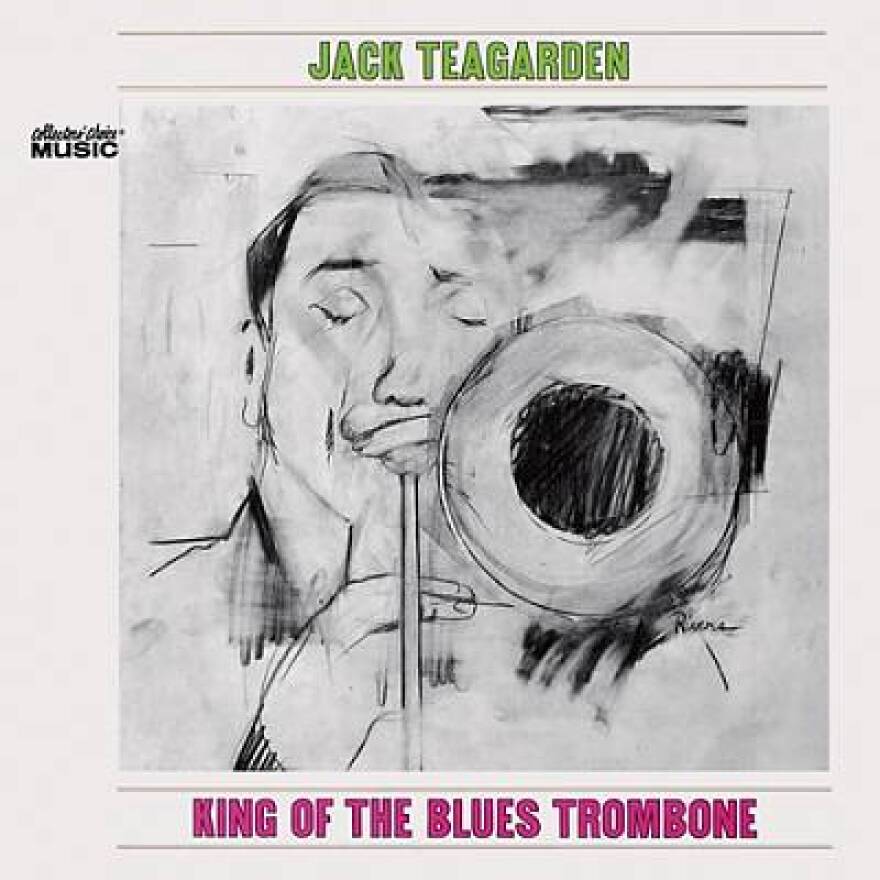[Ed. note: This post was originally published on August 20, 2015]
My favorite version of the Louis Armstrong-Jack Teagarden staple “Rockin’ Chair” is from a 1957 television special. Armstrong had first recorded this homespun lament by Hoagy Carmichael on December 13, 1929, with the composer in the voice of the aging father and Armstrong as the dutiful son. (Eight years later, Mildred Bailey recorded a masterful version that gave her a new identity as “The Rockin’ Chair Lady.”)
Armstrong played “Rockin’ Chair” throughout the thirties and recorded it on a couple of occasions, but Ricky Riccardi reports on his blog The Wonderful World of Louis Armstrong that it “seems to have disappeared during the war years,” as there are no documented performances of the song between 1940-’46. It was revived, however, for the Carnegie Hall concert that Armstrong played on February 8, 1947 (and it would remain a showpiece in his repertoire thereafter). At the time, Leonard Feather and others were urging Armstrong to abandon the hackneyed, oft-criticized orchestra he’d been fronting since the early thirties, and Louis was tempted. He’d recorded with small groups occasionally in the forties and fronted a Hot Five-style combo in the 1947 movie New Orleans, but his risk averse manager, Joe Glaser, was reluctant to let Louis change course altogether. Thus, at Carnegie Hall, Armstrong appeared with clarinetist Edmond Hall’s small combo during the first half of the concert, and with the big band for the second.

“Rockin’ Chair” was part of Pops’s opening set at Carnegie, where bassist Johnny Williams joined him for the dialogue. In his 2011 biography What a Wonderful World, The Magic of Louis Armstrong’s Later Years, Riccardi reports that their “hilarious duet…brought down the house.” Such successes were never lost on Armstrong (or Glaser), and later that spring, when he played the famous Town Hall concert that effectively launched his All-Stars, “Rockin’ Chair,” and Teagarden, were in the mix.

Big T was recruited for the Town Hall concert by cornetist Bobby Hackett, who’d been deputized to put together a group suitable for Pops. Riccardi says their initial performance of “Rockin’ Chair” was “arguably its greatest version…the love between the two men…wonderfully in evidence,” much as it is in my preferred 1957 version. The concert won immediate critical and popular acclaim (Riccardi quotes Peter Tanner’s Melody Maker review: “His playing had all the freshness and vigor of the early Hot Five and Seven days.”) and by July the big band was abandoned. Teagarden signed-on as a charter member of the newly minted Louis Armstrong and his All-Stars, which made its debut at Billy Berg’s Los Angeles nightclub on August 13, 1947.

The trombonist went way back with Armstrong. They’d first met when the teen-aged Teagarden arrived in New Orleans already renowned for his work with Houston-based pianist Peck Kelly, and Louis was a local legend working with Fate Marable on a Mississippi steamboat. In Satchmo: My Life in New Orleans, Armstrong wrote, “The first time I heard Jack Teagarden on the trombone I got goose pimples all over; in all my experience I had never heard anything so fine…We have been musically jammed buddies ever since we met.” Indeed, on March 5, 1929, the first day of recording activity for Armstrong upon his return to New York (the decade found him based in New Orleans-Chicago-New York-Chicago-New York), they recorded the classic “Knockin’ a Jug;” Big T’s opening two choruses on the themeless blues alone would have earned him the sobriquet “King of the Blues Trombone.”
Eighteen years later, Teagarden chose “St. James Infirmary” as his solo feature at Town Hall, where the Vernon, Texas native introduced it as the oldest blues he’d ever heard. “Stardust” and “Stars Fell on Alabama” would become additional showcases for Big T before he left Louis in 1951 to take what proved to be a modestly successful crack at leading his own combo.
Teagarden had a long association of his own with Carmichael, and Riccardi says he may have been hanging out in the studio with Pops and Hoagy in 1929. This rare 1939 footage finds a stone-faced Hoagy backed by Big T’s short-lived orchestra on the episodic “Washboard Blues.” That’s followed by the pair sparring tongue-in-cheek over Teagarden’s penchant for playing his own “style,” shorthand for improvising on tunes by composers like Carmichael, before we hear Jack’s trombone introduce “Rockin’ Chair.”
Here’s the 1957 television version. Its delights include this exchange: Pops: “Looks like your cane layin’ down there by your side.” Big T: “Well, I use it for a trombone sometimes.” Pops, in a suggestive sub-tone: “Is that all?” Later, to Pops’s, “You ain’t goin’ nowhere,” Big T replies, “I done been where I was goin’ before/I ain’t goin’ there no more.” Bobby Hackett had heard it all many times before, but his smile conveys the fresh sense of joy common to all who bask in the eternal pleasures of the principals.
Big T and Pops always appeared the best of friends (All-Star Barney Bigard said, , and the trombonist was invariably sought for reunions and special appearances like the 1958 Newport Jazz Festival, where “Rockin’ Chair” was, of course, part of the show. In 1949, when Armstrong sat with Leonard Feather for a Blindfold Test in Metronome, he had this reaction to Bill Harris’s trombone solo on Woody Herman’s “Keeper of the Flame.” “Now you take this trombone solo…Jack Teagarden will take a solo like that, and it’ll be much prettier, it’ll say something, and it’ll be just as hot.”
Jack Teagarden was born 110 years ago today. He died in New Orleans on January 15, 1964, at age 58.




